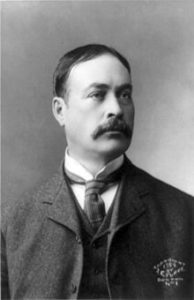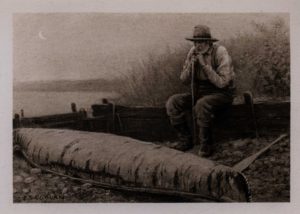April is National Poetry Month, the largest literary celebration in the world, with tens of millions of readers, students, teachers, librarians, booksellers, publishers, poets, and, of course, bloggers marking poetry’s important place in our culture and our lives. And who better for La Compagnie to celebrate than the man once called “the pathfinder of a new land of song,” William Henry Drummond?
According to the Dictionary of Canadian Biography, Drummond (1854-1907) was an Irish-born Canadian poet and physician, whose humorous dialect poems made him “one of the most popular authors in the English-speaking world,” and “one of the most widely-read and loved poets” in Canada. His poetry and performances were extremely successful, establishing for him a reputation as a writer of dialect verse that has faded since his death.
When he was 14, William was apprenticed as a telegraph operator. He trained and worked at L’Abord-a-Plouffe, now in Laval, on the Lake of Two Mountains, “a Quebec lumber town where he had his first encounters with the habitants and voyageurs who were to inspire (and even to preoccupy) the poet.”
The Habitant, and other poems appeared in 1897, with illustrations by Canadian landscape artist F.S. Coburn and an enthusiastic introduction (in French) by prominent French Canadian poet, Louis Fréchette. According to Fréchette, Henry Wadsworth Longfellow praised Drummond, calling him “the pathfinder of a new land of song.” With Fréchette’s assurance that Drummond’s dialect poetry did not mock them, French Canadians at the time “wholeheartedly supported his verse.”
Drummond once noted that he had not written his verses “as examples of a dialect, or with any thought of ridicule.” Having lived beside French Canadians most of his life, he had “grown to admire and love them.” Although the English-speaking public might be familiar with the urban French Canadian, he wrote that it “had little opportunity of becoming acquainted with the habitant.” Drummond therefore “endeavored to paint a few types.” He said, “It has seemed to me that I could best attain the object in view by having my friends tell their own tales in their own way, as they would relate them to English-speaking auditors not conversant with the French tongue.”
Many La Compagnie members will remember Tom Brennan’s affection for Drummond’s verse, especially The Voyageur . . .
Dere’s somet’ing stirrin’ ma blood tonight,
On de night of de young new year,
Wile de camp is warm an’ de fire is bright,
An’ de bottle is close at han’–
Out on de reever de nort’ win’ blow,
Down on de valley is pile de snow,
But w’at do we care so long we know
We ‘re safe on de log cabane?
Drink to de healt’ of your wife an’ girl,
Anoder wan for your frien’,
Den geev’ me a chance, for on all de worl’
I ‘ve not many frien’ to spare–
I ‘m born, w’ere de mountain scrape de sky,
An’ bone of ma fader an’ moder lie,
So I fill de glass an’ I raise it high
An’ drink to de Voyageur.
For dis is de night of de jour de l’an,
W’en de man of de Grand Nor’ Wes’
T’ink of hees home on de St. Laurent,
An’ frien’ he may never see–
Gone he is now, an’ de beeg canoe
No more you ‘ll see wit’ de red-shirt crew,
But long as he leev’ he was alway true,
So we ‘ll drink to hees memory.
Ax’ heem de nort’ win’ w’at he see
Of de Voyageur long ago,
An’ he ‘ll say to you w’at he say to me,
So lissen hees story well–
“I see de track of hees botte sau-vage
On many a hill an’ long portage
Far far away from hees own vill-age
An’ soun’ of de parish bell–
“I never can play on de Hudson Bay
Or mountain dat lie between
But I meet heem singin’ hees lonely way
De happies’ man I know–
I cool hees face as he ‘s sleepin’ dere
Under de star of de Red Rivière,
An’ off on de home of de great w’ite bear,
I ‘m seein’ hees dog traineau.
“De woman an’ chil’ren ‘s runnin’ out
On de wigwam of de Cree–
De leetle papoose dey laugh an’ shout
W’en de soun’ of hees voice dey hear–
De oldes’ warrior of de Sioux
Kill hese’f dancin’ de w’ole night t’roo,
An de Blackfoot girl remember too
De ole tam Voyageur.
“De blaze of hees camp on de snow I see,
An’ I lissen hees ‘En Roulant’
On de lan’ w’ere de reindeer travel free,
Ringin’ out strong an’ clear–
Offen de grey wolf sit before
De light is come from hees open door,
An’ caribou foller along de shore
De song of de Voyageur.
“If he only kip goin’, de red ceinture,
I ‘d see it upon de Pole
Some mornin’ I ‘m startin’ upon de tour
For blowin’ de worl’ aroun’–
But w’erever he sail an’ w’erever he ride,
De trail is long an’ de trail is wide,
An’ city an’ town on ev’ry side
Can tell of hees campin’ groun’.”
So dat ‘s ‘de reason I drink to-night
To de man of de Grand Nor’ Wes’,
For hees heart was young, an’ hees heart was light
So long as he ‘s leevin’ dere–
I ‘m proud of de sam’ blood in my vein
I ‘m a son of de Nort’ Win’ wance again–
So we ‘ll fill her up till de bottle ‘s drain
An’ drink to de Voyageur.
Another favorite of Tom’s was Phil-o-rum’s Canoe, found here at Project Gutenberg.
Drummond published many volumes of verse after his initial success with The Habitant. There’s still lots of time left in April to celebrate National Poetry Month with Drummond. Try some of these. In my humble opinion, they’re best read aloud, and with gusto!
• The Habitant and Other French-Canadian Poems. New York: G.P. Putnam’s Sons, 1897.
• Phil-o-rum’s Canoe and Madeleine Vercheres: Two Poems, New York: G.P. Putnam’s Sons, 1898.
• Johnnie Courteau and Other Poems. New York: G.P. Putnam’s Sons, 1901.
• The Voyageur and Other Poems. New York: G.P. Putnam’s Sons, 1905.
• The Great Fight: Poems and Sketches. New York: G.P. Putnam’s Sons, 1908.
• The Poetical Works of William Henry Drummond. New York: G.P. Putnam’s Sons, 1912. Reprinted as W.H. Drummond’s Complete Poems. Toronto: McClelland & Stewart, 1926.
• Habitant Poems. Arthur Leonard Phelps ed. Toronto: McClelland & Stewart, 1959. reprinted, 1970.



